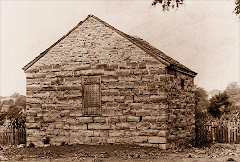 Edward Sanford Martin has said “Thanksgiving Day comes by statute once a year. To the honest man it comes as frequently as the heart of gratitude will allow.”
Edward Sanford Martin has said “Thanksgiving Day comes by statute once a year. To the honest man it comes as frequently as the heart of gratitude will allow.”It was not until 1863 that Thanksgiving Day became a national Holiday as declared by President Abraham Lincoln. At this time of year and particularly on Thanksgiving Day, we are reminded to offer our gratitude to the Lord, as well as to our family, friends and neighbors. As citizens of this great nation we have a rich heritage we can appreciate and be thankful for. Our American heritage, including the trials and efforts of our Pilgrim ancestors, is a blessing given to us from the Lord.
Instead of sharing a history of the Pilgrims and the origins of Thanksgiving I think it is more important to discuss the value of giving thanks to the Lord, to our neighbors, and how we can show our gratitude.
Luke 17:12-19
12 And as he entered into a certain village, there met him ten men that were lepers, which stood afar off:
13 And they lifted up their voices, and said, Jesus, Master, have mercy on us.
14 And when he saw them, he said unto them, Go shew yourselves unto the priests. And it came to pass, that, as they went, they were cleansed.
15 And one of them, when he saw that he was healed, turned back, and with a loud voice glorified God,
16 And fell down on his face at his feet, giving him thanks: and he was a Samaritan.
17 And Jesus answering said, Were there not ten cleansed? but where are the nine?
18 There are not found that returned to give glory to God, save this stranger.
19 And he said unto him, Arise, go thy way: thy faith hath made thee whole
Only one man, a Samaritan who was despised of the Jews, returned to offer gratitude to the Lord. Even Jesus asked “ Where are the 9”? Why did the others not return to offer gratitude to the Lord for being healed? We may look at this story, and think how simple it should have been to return and give thanks. But do we return and give thanks to the Lord for our blessings, and do we return and thank others.
In 1 Thessalonians 5:18 Paul counseled “ In everything give thanks; for this is the will of God in Christ Jesus concerning you.”
To the Corinthians Paul proclaimed “Thanks be unto God for his unspeakable gift” ( 2 Cor 9:15 ) How often do we thank God for his unspeakable gift.
From the passages I have just shared we can see that showing gratitude is important to the Lord. But why is it so important? What is the purpose of showing thanksgiving and gratitude? I believe there are a couple of purposes and a reason why He desires that we are a grateful people.
In Matthew 22:36-39 Jesus responds to the question about which is the greatest of all commandments.
36 Master, which is the great commandment in the law?
37 Jesus said unto him, Thou shalt love the Lord thy God with all thy heart, and with all thy soul, and with all thy mind.
38 This is the first and great commandment.
39 And the second is like unto it, Thou shalt love thy neighbour as thyself
We are to Love God and we are to love our neighbors as we love ourselves. How can we Love God, and how can we love our neighbor if we do not have the humility to show gratitude to them.
The first reason it is important to show gratitude is that it shows our humility before the Lord and our love of Him. Like the Samaritan who returned to “Glorify God” and offer thanksgiving, we too can acknowledge the greatness of God by offering our grattitude directly through prayer, as well as indirectly by serving others and being grateful to others.
The 2nd important reason we show gratitude is to show our love of our neighbors.
Acts of gratitude may be simple, but they are also powerful. A story is told of a grown man who had his memory pricked concerning a favorite teacher from grade school. He made the effort to locate this teacher and wrote her a brief note, offering his thanks for her teaching and care. The man later received a letter back from this elderly teacher, overcome by the note of thanksgiving she received. She explained that in all of her years of teaching, his note of gratitude was the first she had ever received. The simple note became a treasure to her.
I believe as we are kind to others and as we thank others, our words and deeds of thanksgiving also praise God.
A familiar passage comes to mind in Matthew 25: 35-40.
35 For I was an hungred, and ye gave me meat: I was thirsty, and ye gave me drink: I was a stranger, and ye took me in:
36 Naked, and ye clothed me: I was sick, and ye visited me: I was in prison, and ye came unto me.
37 Then shall the righteous answer him, saying, Lord, when saw we thee an hungred, and fed thee? or thirsty, and gave thee drink?
38 When saw we thee a stranger, and took thee in? or naked, and clothed thee?
39 Or when saw we thee sick, or in prison, and came unto thee?
40 And the King shall answer and say unto them, Verily I say unto you, Inasmuch as ye have done it unto one of the least of these my brethren, ye have done it unto me
What we do unto our neighbor is the same as doing it unto our God. As we love our neighbor we love our God. As we thank our neighbor, we thank our God and we are keeping the 2 great commandments of loving God and loving our neighbor.
Thomas S. Monson has said- “ Whatever language is spoken, “Thank you”, frequently expressed will cheer your spirit, broaden your friendships, and lift your lives to a higher pathway”
Just think about how the man showing gratitude to his teacher or the Samaritan who was healed, praised God and offered his thanks. How did that affect his life?
Offering a simple thank you is easy to do and can have a tremendous impact on both the giver and the receiver.
2 Corinthians 9:7 Every man according as he purposeth in his heart, so let him give; not grudgingly, or of necessity: for God loveth a cheerful giver.
When we give repeatedly, we become a cheerful giver. When we are stingy in giving, the rare times that we do give become more of a struggle and we are less cheerful in giving. When we give our thanks and gratitude we are also giving a touch of joy and happiness. As we practice and make a habit out of showing gratitude to others we become cheerful givers.
We have so much to be thankful for. As we offer gratitude we please the Lord and we are blessed with great joy and happiness in our lives. We can share that joy with others. Lets be like the Samaratin, and the man who gave thanks to his teacher, and the boy who was offered a gift. Let us be cheerful givers of gratitude to the Lord and our neighbors.
2 Cor 9:15 Thanks be unto God for his unspeakable gift. Lets be thankful to our Heavenly Father for his unspeakable gift. The gift of the Saviors life touches each of us.

























